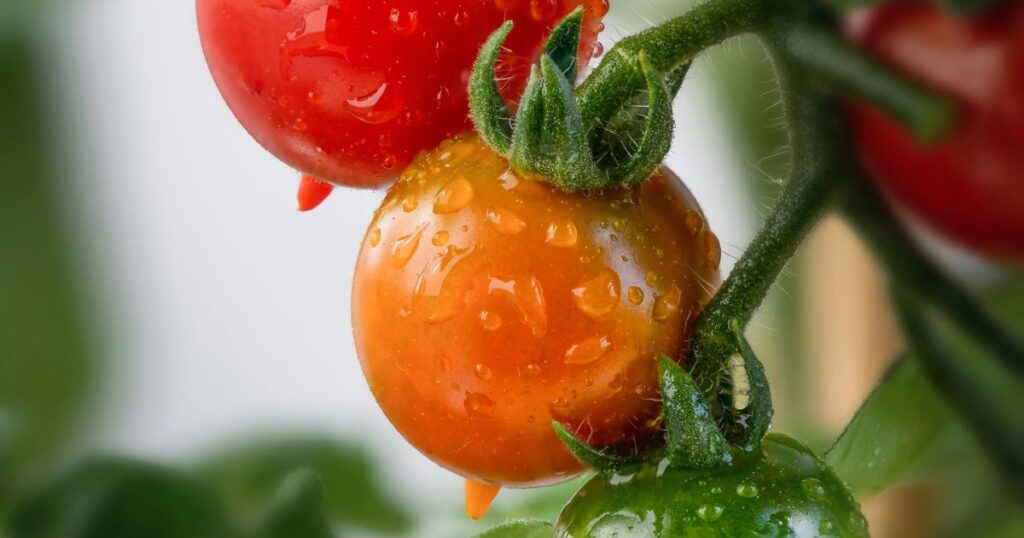Can Dogs Eat Cherry Tomatoes? Learn the 3 Big Dos and Don’ts
Table of Contents
Can Dogs Eat Cherry Tomatoes? As a pet owner, you may wonder if it’s safe to share cherry tomatoes from your garden with your dog. The answer isn’t straightforward. While some dogs can safely eat cherry tomatoes, there are important factors to consider. In this article, we’ll explore the dos and don’ts of feeding cherry tomatoes to your dog so you can make the best decision for their health and safety.
Key Takeaways
- Cherry tomatoes can be a safe treat for dogs in moderation.
- Tomato plants and unripe tomatoes contain a compound called solanine that can be toxic to dogs.
- Portion control is crucial when feeding cherry tomatoes to your dog.
- Before adding any new human foods to your dog’s diet, speak with your veterinarian.
- Offer a variety of safe, dog-friendly fruits and vegetables as healthy alternatives.
Understanding the Safety of Cherry Tomatoes for Dogs
Feeding cherry tomatoes to your dog is a big decision. They can be good for your pet, but you need to be careful. It’s all about keeping your dog healthy.
Nutritional Benefits of Cherry Tomatoes
Cherry tomatoes are full of good stuff for dogs. They have vitamins A and C, and antioxidants like lycopene. These support the health of your dog’s immune system.
Key Components in Cherry Tomatoes
- Vitamin A: Supports vision, skin, and coat health
- Vitamin C: Boosts the immune system and promotes collagen production
- Lycopene: Powerful antioxidant with anti-inflammatory properties
- Potassium: Helps maintain healthy blood pressure and muscle function
Potential Health Benefits for Dogs
Cherry tomatoes can be good for dogs in small amounts. They strengthen the immune system, prevent damage, and support the health of the skin and coat. But, always talk to your vet before adding them to your dog’s diet.
| Nutrient | Benefit |
|---|---|
| Vitamin A | Supports vision, skin, and coat health |
| Vitamin C | Boosts the immune system and promotes collagen production |
| Lycopene | Powerful antioxidant with anti-inflammatory properties |
| Potassium | Helps maintain healthy blood pressure and muscle function |
Can Dogs Eat Cherry Tomatoes? The Complete Guide
Are you wondering if it’s safe to feed your dog cherry tomatoes? It’s key to know the good and bad before adding new foods. This guide will cover can dogs eat tomato and are tomatoes good for dogs fully.
First, dogs can safely eat modest amounts of cherry tomatoes. But, the tomato plant itself can be harmful. We’ll look into that more later. For now, let’s talk about the good things cherry tomatoes can do for your dog.
The Nutritional Value of Cherry Tomatoes for Dogs
Cherry tomatoes are full of vitamins and minerals good for your dog. They offer:
- Vitamin C, which boosts the immune system
- Vitamin K, important for blood clotting
- Fiber, for healthy digestion
- Antioxidants like lycopene, to fight inflammation
Adding cherry tomatoes in small amounts can make your dog’s diet more nutritious and tasty.
Recommended Serving Sizes and Precautions
Cherry tomatoes are mostly safe for dogs, but watch the amount. A few tomatoes a day is usually okay. But, adjust this based on your dog’s size, breed, and health.

Also, don’t give your dog any green tomato parts. They have solanine, which is toxic. Make sure to remove stems and leaves before giving cherry tomatoes to your dog.
Every dog is different, so talk to your vet before adding cherry tomatoes to your dog’s diet. They can give advice tailored to your dog’s needs and health.
The Hidden Dangers of Tomato Plants for Your Pet
Cherry tomatoes might be a fun snack for dogs, but the whole tomato plant is dangerous. The plant contains solanine, a toxic compound. It can harm your dog if they eat it.
Green Tomatoes and Solanine Toxicity
Solanine is a natural defense for tomato plants. But it’s toxic to dogs. Eating green tomatoes or any plant part can cause serious health issues.
Recognizing Tomato Plant Poisoning Symptoms
- Vomiting
- Diarrhea
- Lethargy
- Lack of coordination
- Difficulty breathing
- Dilated pupils
Emergency Steps for Tomato Plant Exposure
If your dog eats a tomato plant, act fast. Call your vet or the ASPCA Animal Poison Control Center. They might need to induce vomiting or give other treatments.
To keep your dog safe, keep them away from tomato plants. Check your garden often. Make sure your dog can’t get to the plants. This way, you can protect your pet from harm.
Safe Serving Methods and Portion Control
Feeding can dogs eat tomato requires careful serving and portion control. Cherry tomatoes are safe for dogs and offer nutritional benefits. But, introducing them should be done with caution.
To serve cherry tomatoes safely, wash and cut them into small pieces. Remove stems, leaves, and vines. This prevents choking and ensures your dog can eat them easily.
- Start with small portions, like one cherry tomato for small dogs. Increase as needed based on size and tolerance.
- Feed can dogs eat tomato only a few times a week. Too much can upset their stomach.
- Mix cherry tomatoes with your dog’s regular food. This makes it more appealing and easier to transition.
Freezing cherry tomato slices can be a cool treat on hot days. Just watch for any signs of discomfort or allergies.
| Dog Size | Recommended Portion | Frequency |
|---|---|---|
| Small (up to 20 lbs) | 1-2 cherry tomato slices | 2-3 times per week |
| Medium (21-50 lbs) | 2-4 cherry tomato slices | 2-3 times per week |
| Large (51 lbs and up) | 3-6 cherry tomato slices | 2-3 times per week |
By following these guidelines, you can safely add safe fruits for dogs like cherry tomatoes. They provide a tasty and nutritious treat for your dog.
Signs Your Dog May Have Tomato Sensitivity
Cherry tomatoes are usually safe for dogs, but some may react to certain compounds. Watching how your dog acts after eating cherry tomatoes is key. This can help spot any problems.
Common Allergic Reactions
Dogs with tomato sensitivity might show skin issues, upset stomachs, or feel tired. Look for rashes, vomiting, diarrhea, or less energy. These signs suggest your dog might not handle cherry tomatoes well.
When to Contact Your Veterinarian
If your dog shows any odd reactions after eating cherry tomatoes, call your vet. They can help figure out how to manage your dog’s sensitivity. They might also suggest safer fruits for your dog to eat.
Alternative Safe Fruits for Dogs
There are many fruits that are safe and tasty for dogs, like blueberries, watermelon, and bananas. These options can be a healthy and yummy treat for your dog. They avoid the risk of tomato sensitivity.
FAQ
Can dogs eat cherry tomatoes?
Yes, dogs can eat cherry tomatoes in small amounts. They are safe because they have vitamins A, C, and K. But, start with a little bit to see if your dog likes them and can handle the acidity.
Are tomatoes good for dogs?
Ripe, red tomatoes are okay for dogs in small amounts. They have good stuff like antioxidants and vitamins. But, avoid the green parts and leaves because they have a toxic compound called solanine.
Are green tomatoes bad for dogs?
Yes, green tomatoes are bad for dogs. They have a lot of solanine, which can hurt your dog’s stomach, brain, and organs. Keep your dog away from green tomatoes and tomato plants.
What are the benefits of cherry tomatoes for dogs?
Cherry tomatoes are good for dogs in small amounts. They have vitamins A, C, and K, and antioxidants like lycopene. These help your dog’s immune system, eyes, and skin. They also help with digestion. But, start slow to make sure your dog is okay with them.
Can a dog eat cherry tomatoes?
Yes, dogs can eat cherry tomatoes in moderation. They are safe because they are small and not too acidic. Make sure to remove the stem and leaves because they have more solanine. Start with a little bit and watch for any signs of upset stomach or other problems.
What are some safe fruits for dogs?
Safe fruits for dogs include: • Apples (without seeds or core) • Bananas • Blueberries • Cantaloupe • Honeydew melon • Mango • Oranges (without seeds or peel) • Pineapple • Strawberries Always start with a little bit and talk to your vet if you’re unsure about your dog’s diet.

